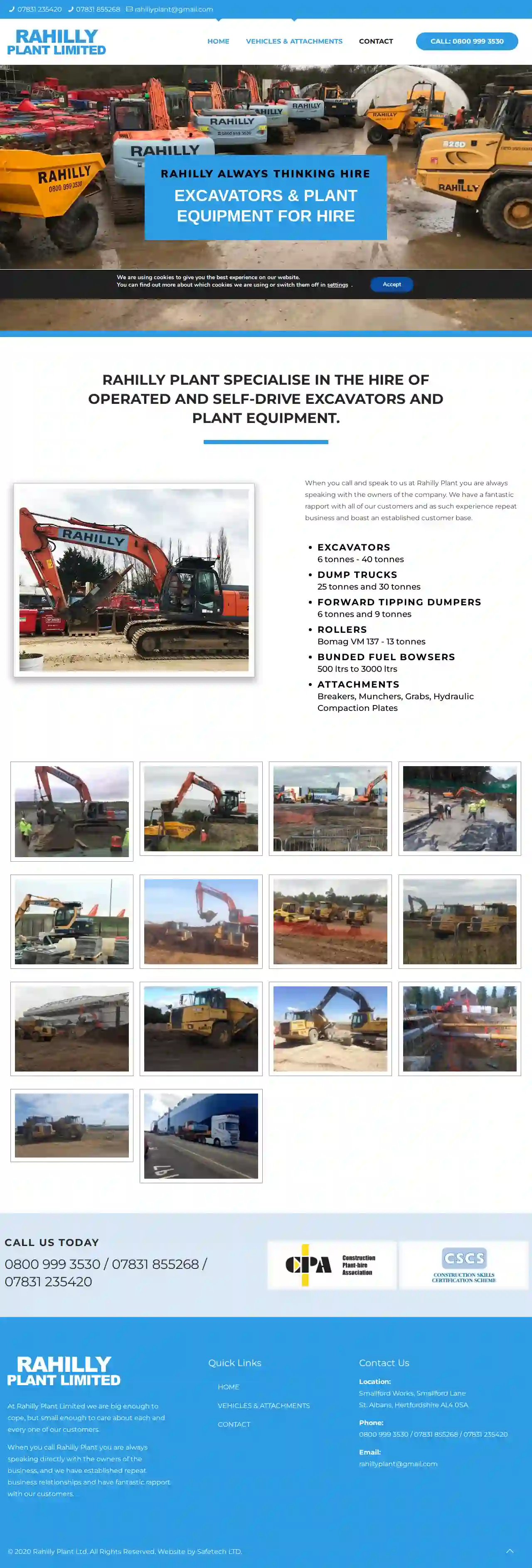Excavation Contractors Wallington
Best Excavation Companies in Wallington
Get 3 FREE Digging Contractors quotes for your project today! Compare profiles, reviews, accreditations, portfolio, etc... and choose the best offer.

Rahilly Plant Ltd
55 reviewsSmallford Works, Smallford Lane, St. Albans, AL4 0SA, GBRahilly Plant: Your Trusted Partner for Excavator and Plant Equipment Hire Rahilly Plant specializes in providing high-quality operated and self-drive excavators and plant equipment for hire. We are a family-run business with a strong commitment to customer satisfaction. When you call Rahilly Plant, you're always speaking directly with the owners, ensuring personalized service and a deep understanding of your needs. We pride ourselves on our fantastic rapport with our customers, which has led to a loyal and growing customer base. We are dedicated to providing reliable equipment and exceptional service, making us the go-to choice for your construction and excavation projects. At Rahilly Plant, we are big enough to handle your project, but small enough to care about each and every one of our customers. We are committed to building long-term relationships based on trust and mutual respect.
- Services
- Why Us?
- Gallery
Get Quote
Linnets Construction
51 reviewsSutton, GBAbout Us Linnets Construction is a family-run business with over 30 years of experience in building and landscaping services. We are committed to providing reliable, knowledgeable, and meticulous service to our clients. We offer free surveys, advice, and quotations to ensure you have all the information you need to make informed decisions about your project. Where we're based We are based near St Albans and also cover areas such as Harpenden, Luton, Hatfield, Welwyn, Welwyn Garden City, Hitchin, Watford, Radlett, Borehamwood, Brookmans Park, Hemel Hempstead, Berkhampstead and North London.
- Services
- Why Us?
- Gallery
Get Quote
Clive Charles Construction
3.73 reviews31A Frogmore, Park Street St Albans, St Albans, AL2 2NG, GBINSPIRE, CREATE, DELIVER Clive Charles is a proven established Prime Residential/fit-out contractor with over 35 years of delivering the utmost quality. With an extensive portfolio of successfully completed projects, including the finest Listed period buildings to cutting edge contemporary residences throughout London and the UK. From concept to completion, Clive Charles maintain close relationships with the client and appointed team working collaboratively to fulfil all project objectives striving to exceed the highest expectations. "With over 30 years experience in the super prime refurbishment market, we deliver quality with efficiency and pride."
- Services
- Why Us?
- Gallery
Get Quote- Ki
Kilkern
4.25 reviewsSutton, GB- Services
- Why Us?
Get Quote 
St Albans Basement
4.610 reviewsSutton, GB- Services
- Why Us?
Get Quote- Jo
John Sisk & Son
3.219 reviewsSutton, GB- Services
- Why Us?
Get Quote - R
R J GROUNDWORKS
Sutton, GB- Services
- Why Us?
Get Quote 
RJ Deamer Groundworks
Sutton, GB- Services
- Why Us?
Get Quote- Ve
Verulamium Park
4.7Sutton, GB- Services
- Why Us?
Get Quote - AB
AB Construction Group Ltd.
52 reviewsSutton, GB- Services
- Why Us?
Get Quote
Over 13,059+ Excavation Pros on our directory
Our excavation contractors operate in Wallington & surroundings!
ExcavationHQ has curated and vetted Top Excavation Contractors in Wallington. Find the most reliable pro today.
Frequently Asked Questions About Excavation Contractors
- Excavations Deeper Than a Certain Depth: This varies by jurisdiction, usually around 5 feet.
- Excavations Near Utilities: Digging near buried utilities (gas, water, electric) often requires permits and utility locates to prevent damage.
- Excavations Affecting Public Property: Projects impacting sidewalks, roads, or other public areas typically require permits.
- Excavations in Environmentally Sensitive Areas: Projects in wetlands, floodplains, or other sensitive areas might need special permits.
- Trench Collapses: Unstable trench walls can cave in, posing a severe risk to workers. Proper shoring and sloping are crucial safety measures.
- Utility Damage: Striking underground utilities (gas, water, electric) can cause leaks, explosions, or electrocution. Accurate utility locates and careful digging are essential.
- Falling Objects: Materials or equipment falling into excavations can injure workers. Securing work areas and using appropriate safety gear is vital.
- Equipment Accidents: Operating heavy machinery involves risks of rollovers, collisions, or mechanical failures. Trained operators and proper equipment maintenance are critical.
- Environmental Hazards: Excavated soil might contain hazardous materials (asbestos, lead). Proper testing and disposal procedures are necessary.
- Mechanical Excavation: Utilizing heavy equipment like excavators, backhoes, bulldozers, and loaders, suitable for most projects.
- Hand Excavation: Using hand tools (shovels, picks) for smaller excavations or delicate work near utilities.
- Blasting: Employing explosives to break up rock or hard materials, typically for large-scale projects.
- Hydro Excavation: Using high-pressure water jets to loosen and remove soil, often used for locating utilities or delicate excavation.
- Vacuum Excavation: Employing a vacuum system to suck up excavated material, suitable for safe excavation near utilities or in confined spaces.
Do I need a permit for excavation?
What are the risks associated with excavation?
What are the different methods of excavation?
What is the difference between topsoil and subsoil?
Topsoil: The uppermost layer, typically rich in organic matter, nutrients, and microorganisms. It's essential for plant growth and is often darker in color.
Subsoil: The layer beneath the topsoil, containing less organic matter and generally denser. It provides support for roots but is less fertile than topsoil.
During excavation, topsoil is often removed and preserved separately for later use in landscaping, while subsoil is typically used for backfilling or other less demanding applications.
Do I need a permit for excavation?
- Excavations Deeper Than a Certain Depth: This varies by jurisdiction, usually around 5 feet.
- Excavations Near Utilities: Digging near buried utilities (gas, water, electric) often requires permits and utility locates to prevent damage.
- Excavations Affecting Public Property: Projects impacting sidewalks, roads, or other public areas typically require permits.
- Excavations in Environmentally Sensitive Areas: Projects in wetlands, floodplains, or other sensitive areas might need special permits.
What are the risks associated with excavation?
- Trench Collapses: Unstable trench walls can cave in, posing a severe risk to workers. Proper shoring and sloping are crucial safety measures.
- Utility Damage: Striking underground utilities (gas, water, electric) can cause leaks, explosions, or electrocution. Accurate utility locates and careful digging are essential.
- Falling Objects: Materials or equipment falling into excavations can injure workers. Securing work areas and using appropriate safety gear is vital.
- Equipment Accidents: Operating heavy machinery involves risks of rollovers, collisions, or mechanical failures. Trained operators and proper equipment maintenance are critical.
- Environmental Hazards: Excavated soil might contain hazardous materials (asbestos, lead). Proper testing and disposal procedures are necessary.
What are the different methods of excavation?
- Mechanical Excavation: Utilizing heavy equipment like excavators, backhoes, bulldozers, and loaders, suitable for most projects.
- Hand Excavation: Using hand tools (shovels, picks) for smaller excavations or delicate work near utilities.
- Blasting: Employing explosives to break up rock or hard materials, typically for large-scale projects.
- Hydro Excavation: Using high-pressure water jets to loosen and remove soil, often used for locating utilities or delicate excavation.
- Vacuum Excavation: Employing a vacuum system to suck up excavated material, suitable for safe excavation near utilities or in confined spaces.
What is the difference between topsoil and subsoil?
Topsoil: The uppermost layer, typically rich in organic matter, nutrients, and microorganisms. It's essential for plant growth and is often darker in color.
Subsoil: The layer beneath the topsoil, containing less organic matter and generally denser. It provides support for roots but is less fertile than topsoil.
During excavation, topsoil is often removed and preserved separately for later use in landscaping, while subsoil is typically used for backfilling or other less demanding applications.